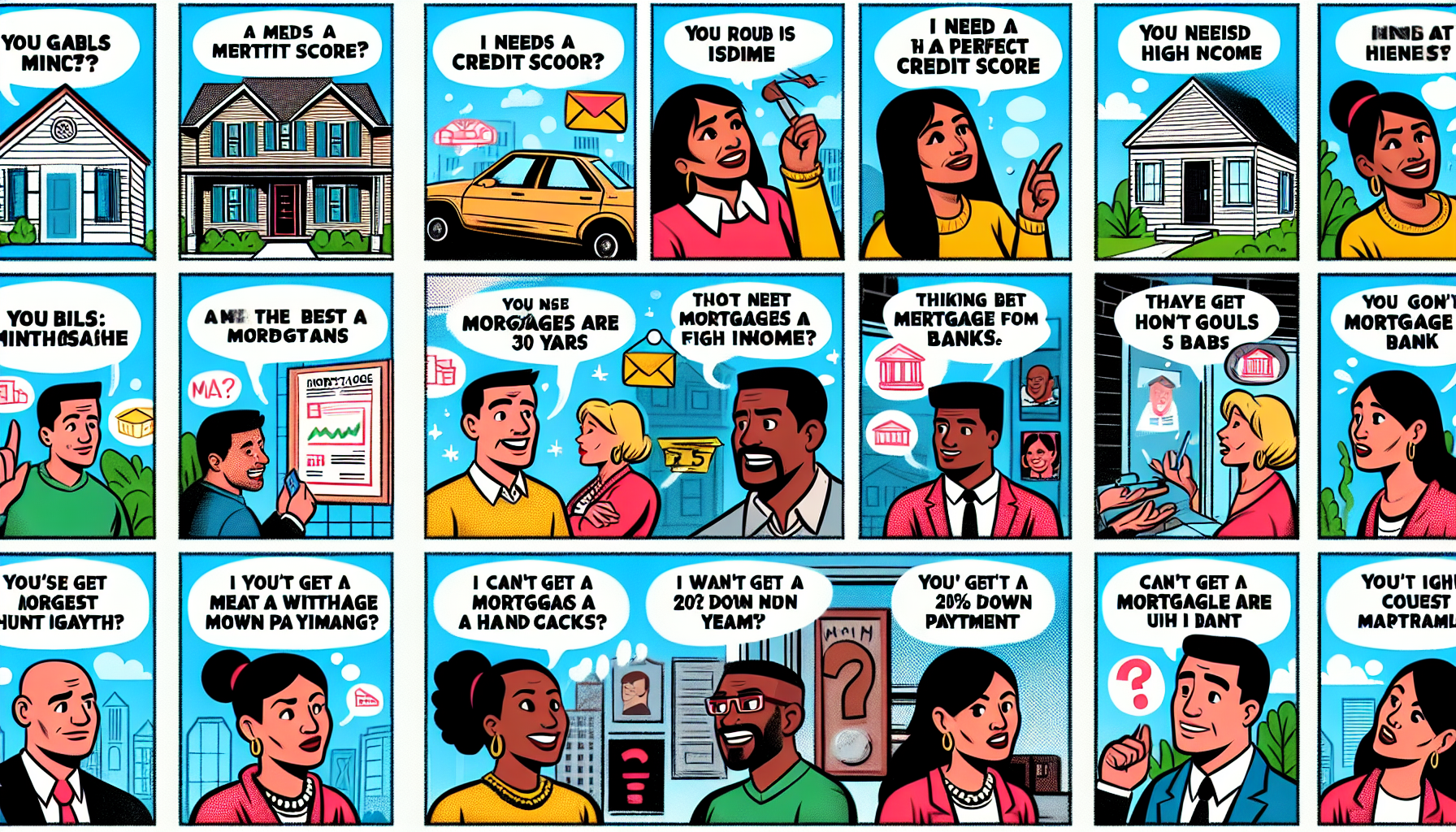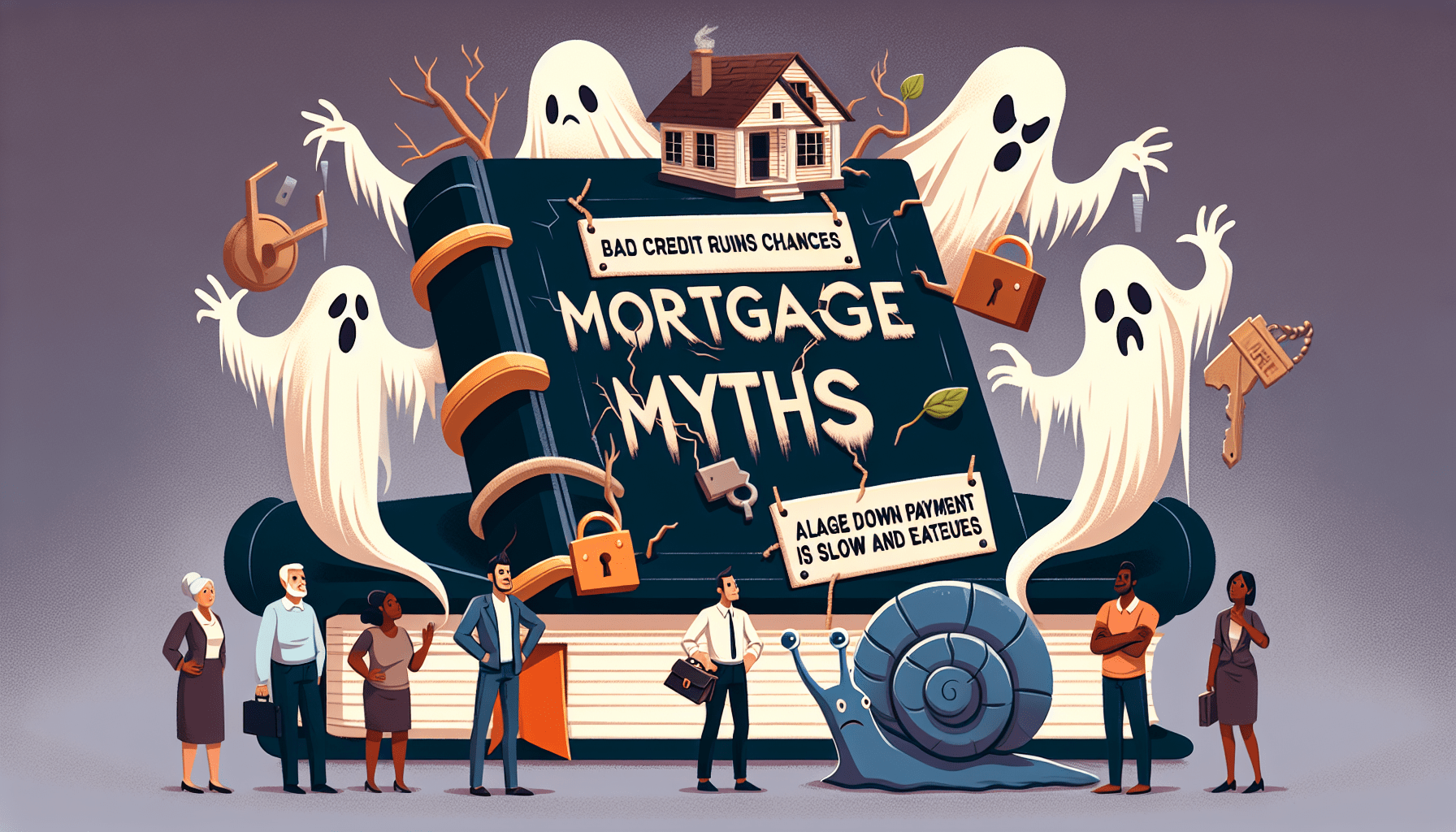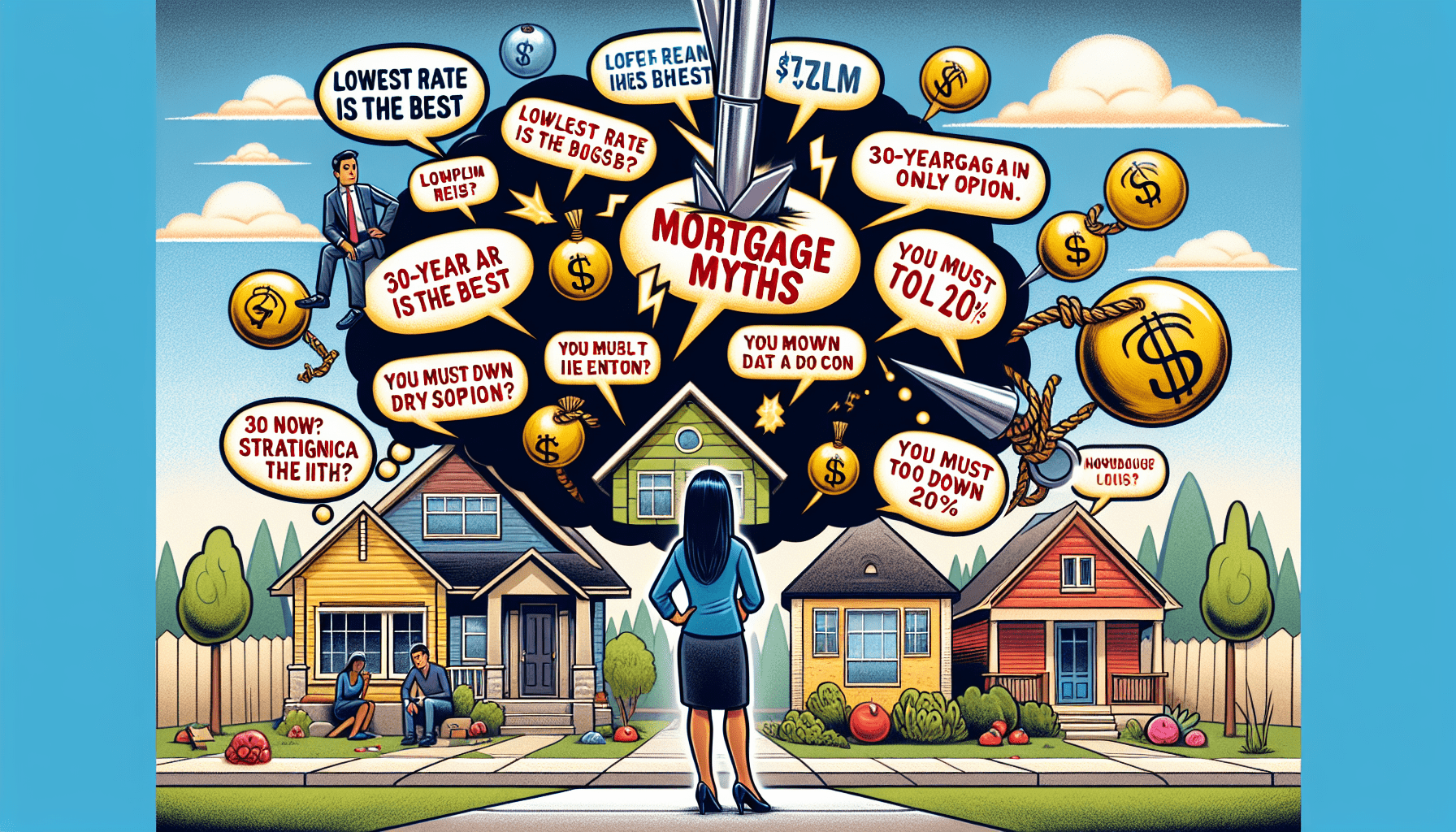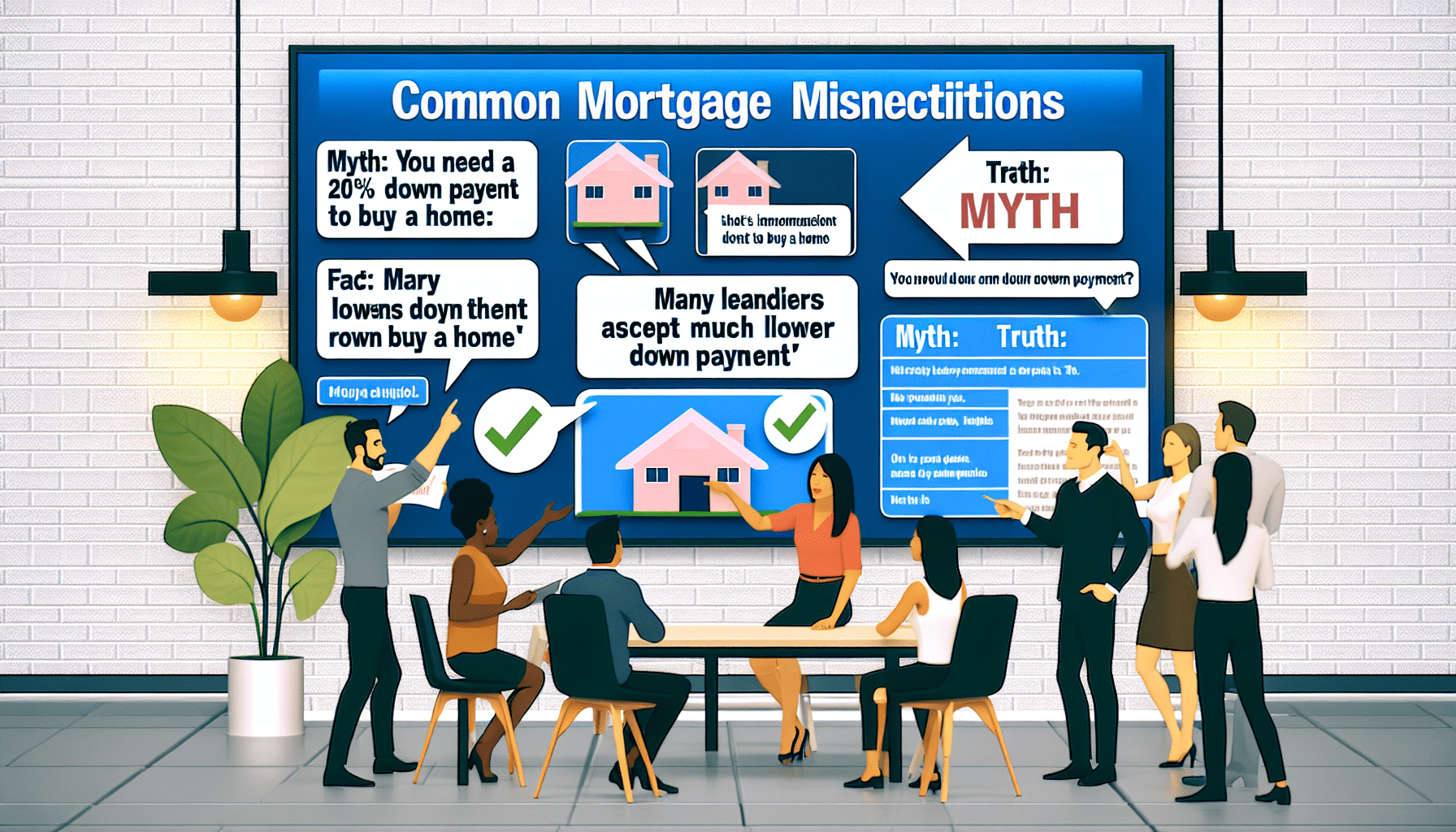7 Mortgage Myths About Credit and Income in 2025 Debunked

Mortgage Myths
What’s Stopping You from Getting a Mortgage in 2025?
In 2025, the landscape of obtaining a mortgage is often shrouded in outdated beliefs and misconceptions that can deter potential homeowners from leaping. One pervasive myth is that a perfect credit score is an absolute necessity to secure a home loan.
While a good credit score is certainly advantageous, lenders now employ more sophisticated AI algorithms that consider a broader spectrum of financial behaviors, offering opportunities to those with less-than-stellar credit histories.
Another common fallacy is the assumption that a 20% down payment is required, but numerous programs exist that allow for lower down payments, some even tailored by AI to match individual financial situations.
As we move forward, it’s crucial to dispel these myths and understand the dynamic, technology-driven options available for aspiring homeowners. Did you know that 83% of first-time homebuyers delay applying for a mortgage due to misinformation? As lending criteria evolve, myths about credit scores, income verification, and debt ratios persist.
In 2025, automation, AI-driven underwriting, and regulatory shifts are reshaping mortgage approvals—but outdated beliefs still trap borrowers. This article dismantles 7 mortgage myths about credit and income in 2025, equipping you with data-driven strategies to secure your dream home.
The Shifting Landscape of Mortgage Approvals

How Have Mortgage Requirements Changed in 2025?
In the ever-evolving world of finance, 2025 has ushered in a new era of mortgage lending, marked by technological advancements and a shift towards more personalized lending criteria. Lenders are now leveraging sophisticated algorithms and artificial intelligence to assess a borrower’s creditworthiness, moving beyond the traditional credit score and income statements.
This progressive approach has opened doors for many potential homeowners, who previously might have been excluded by the rigid frameworks of the past, to finally step onto the property ladder with greater ease and confidence.
By 2025, lenders increasingly prioritize holistic financial health over rigid credit score cutoffs. Tools like AI-powered income verification and alternative credit data (e.g., rent payments, and utility bills) now supplement traditional metrics. However, misconceptions linger. Let’s dissect the top myths.
Debunking 7 Mortgage Myths About Credit and Income in 2025
Myth 1: “You Need a 750+ Credit Score to Qualify”
Reality: While a high credit score can certainly give you a competitive edge, it is no longer the inflexible standard for qualifying for a mortgage. In 2025, lenders are utilizing advanced AI algorithms that take a more holistic view of a borrower’s financial health.
Factors such as consistent income, the stability of your employment history, and your overall debt-to-income ratio now carry significant weight alongside your credit score, offering opportunities to those with scores lower than 750 to secure a home loan.
While a 750 FICO score unlocks the best rates, 62% of 2025 mortgages go to borrowers with scores between 620–749. Programs like FHA loans accept scores as low as 580.
Myth 2: “Freelancers Can’t Get Approved”
Reality: The landscape of employment has shifted dramatically, with the rise of the gig economy and remote work. Lenders are adapting to these changes and now consider a steady income and a solid work history, regardless of employment type.
Freelancers who can provide proof of consistent earnings and a strong financial track record stand a good chance of mortgage approval, particularly if they’ve maintained a healthy credit score and have a reasonable debt-to-income ratio.
Gig workers and freelancers represent 40% of the U.S. workforce. Lenders now use 12–24 months of bank statements and averaged income to assess stability.
Myth 3: “Student Debt Disqualifies You”
Reality: Holding student debt doesn’t automatically disqualify you from securing a mortgage. Lenders are more interested in your ability to manage and repay that debt responsibly. They’ll look at your student loan payment history as part of your overall credit performance.
If you’ve been consistent with your student loan payments and have a manageable debt-to-income ratio including your student debt, homeownership can still be within reach. It’s all about demonstrating financial responsibility and stability to potential lenders.
Debt-to-income (DTI) ratios matter more than absolute debt. A 2024 Freddie Mac study found borrowers with student loans had 11% higher approval rates when DTI stayed below 43%.
Myth 4: “Down Payments Must Be 20%”
Reality: The longstanding belief that a 20% down payment is necessary to secure a mortgage is outdated. Many lenders now offer loan programs that require far less upfront, with some qualifying for mortgages with as little as 3-5% down.
This shift has opened the door to homeownership for a broader range of buyers, particularly first-time homebuyers who may not have substantial savings but can afford monthly mortgage payments. 3% down payment programs (e.g., Conventional 97, USDA loans) thrive in 2025. Even jumbo loans offer 10% options for qualified buyers.
Myth 5: “Job Hopping Ruins Your Chances”
Reality: In the modern workforce, job hopping is no longer the red flag it once was, especially in dynamic fields like technology and creative industries. Lenders are more concerned with income stability and the ability to repay the loan rather than the number of jobs a borrower has had.
As long as there is a consistent work history and proof of a stable or increasing income, many lenders are willing to consider applicants who have switched jobs frequently, recognizing that career growth often involves movement between companies.
Career changes are normalized post-pandemic. Lenders focus on income consistency, not job tenure. A raise or promotion often offsets a short employment history.
Myth 6: “Past Foreclosures Are Permanent Red Flags”
Reality: While past foreclosures can indeed be a significant blemish on a credit report, they are not indelible marks that doom future borrowing prospects. Lenders today are more inclined to consider the context and recovery efforts post-foreclosure.
Typically, after seven years, a foreclosure may no longer negatively impact your credit score, and if you’ve demonstrated financial responsibility and stability since then, lenders may be willing to extend credit or loans despite this historical setback. Post-2020, waiting periods for post-foreclosure mortgages dropped to 3 years (FHA) or 4 years (Conventional).
Myth 7: “Only W-2 Income Counts”
Reality: This is a common misconception that can deter self-employed individuals or those with variable income streams from pursuing homeownership. In truth, lenders are increasingly recognizing the validity of alternative income sources.
As long as you can provide documentation such as tax returns, bank statements, or profit and loss statements that demonstrate a consistent and reliable income, you may qualify for a mortgage.
Lenders will typically look at the average income over the past two years to assess your earning stability. Investment returns, side hustles, and rental income are increasingly valid. Per the CFPB, 27% of 2025 approvals include non-traditional income streams.
Top 5 Google Queries on 2025 Mortgages (Answered)

1: “Can I get a mortgage with a 600 credit score in 2025?”
It’s still possible to secure a mortgage with a 600 credit score in 2025, though your options may be somewhat limited. Lenders are now using more sophisticated AI algorithms to assess creditworthiness, which means they look beyond just the score itself, considering factors such as consistent income, employment history, and even spending habits.
However, you might face higher interest rates or be required to provide a larger down payment to mitigate the lender’s risk. It’s always a good idea to shop around and see which financial institutions offer the best terms for your particular situation. Yes! FHA and VA loans accept 580+, while some subprime lenders go as low as 500 with higher down payments.
2: “How does AI verify income for freelancers?”
AI verification of income for freelancers often involves a combination of advanced algorithms and data analysis techniques. These systems can analyze bank statements, tax returns, and various financial documents to assess income stability and earning patterns over time.
By cross-referencing this information with additional data sources, such as invoices and contracts, AI provides a comprehensive and nuanced picture of a freelancer’s financial health, ensuring lenders have an accurate understanding of the borrower’s ability to repay a loan. Platforms like Borrowly analyze bank deposits, invoicing history, and client contracts to predict earnings.
3: “Is 20% down payment mandatory for investment properties?”
While a 20% down payment is not a hard and fast rule for investment properties, it is often strongly recommended by financial experts and lending institutions.
This sizeable initial investment helps to secure more favorable loan terms, including lower interest rates and monthly payments, and can also serve as a buffer against market fluctuations.
Additionally, putting down 20% or more can eliminate the need for private mortgage insurance (PMI), which lenders typically require for down payments smaller than 20% to protect against default, thereby reducing the overall cost of the loan. No—2025 portfolio loans allow 15% down but require 6 months of cash reserves.
4: “Do lenders count cryptocurrency income?”
Cryptocurrency income presents a unique challenge for lenders when assessing a borrower’s financial stability. While more progressive lenders are beginning to recognize cryptocurrency assets and income, they often require a longer history of consistent earnings and may apply more rigorous verification processes.
Borrowers looking to count cryptocurrency income towards their loan application should be prepared to provide detailed transaction histories and may need to convert their digital assets into traditional currency to meet certain lender’s criteria. Only if it’s documented as regular earnings (e.g., staking rewards) vs. speculative gains.
5: “Can medical debt affect mortgage approval?”
Certainly, medical debt can impact mortgage approval, as lenders typically consider an individual’s debt-to-income (DTI) ratio when evaluating loan applications. High levels of outstanding medical debt could unfavorably skew this ratio, making it more challenging to secure a mortgage.
However, it’s important to note that recent changes to credit reporting have lessened the impact of medical debt on credit scores, which could mitigate some concerns for potential homebuyers carrying this type of debt. Medical collections under $500 are ignored per 2023 FICO changes, and most lenders exclude them from DTI.
Expert Strategies for 2025 Mortgage Success

How to Optimize Your Financial Profile for 2025 Lending
Tip 1: Leverage “Credit-Building” Rent Payments
In the rapidly evolving mortgage landscape of 2025, artificial intelligence (AI) has become a game-changer, especially when it comes to personalizing loan approval processes. Lenders equipped with advanced AI algorithms can now analyze your financial behavior in real time, offering tailored advice on how to improve your creditworthiness.
By engaging with platforms that incorporate this technology, you can receive personalized recommendations for credit management, ensuring your financial profile aligns perfectly with lender expectations and increasing your chances of securing a favorable mortgage deal. Services like RentTrack report rent to credit bureaus, boosting scores by 20–40 points in 6 months.
Tip 2: Reduce “Phantom” Debt
In an era where efficiency is key, leveraging AI to automate your credit health can be a game-changer. By using intelligent systems that monitor your accounts and alert you to potential issues, you can proactively manage your credit score without constant manual oversight.
These AI-driven tools can also suggest the optimal times to pay off certain debts or apply for new credit lines, ensuring you’re making the most strategic financial decisions to bolster your credit profile. Cancel unused credit cards—high limits inflate your potential debt liability, harming DTI calculations.
Tip 3: Pre-Underwriting Is Your Secret Weapon
Leveraging pre-underwriting can give you a significant edge in the home-buying process. This step involves a preliminary review of your financials by a lender, which can uncover any potential issues that might arise during the actual underwriting phase.
By addressing these concerns early, you can streamline your mortgage approval, reduce stress, and potentially negotiate better terms with sellers who see you as a more reliable buyer. Get pre-underwritten (not just pre-approved) to lock rates and identify red flags early.
3 Must-Know Tips for 2025 Mortgage Applicants
1: Use “Rapid Rescoring” to Fix Credit Errors in 72 Hours
In the ever-evolving landscape of mortgage lending, leveraging artificial intelligence to personalize loan options has become a game changer. By inputting your financial details into advanced AI algorithms, you can now receive a curated list of mortgage products that align perfectly with your fiscal situation and homeownership goals.
This not only simplifies the search process but ensures that you’re comparing the most relevant and competitive rates available, tailored just for you. Dispute inaccuracies via services like Lexington Law to fast-track improvements.
2: Maximize “Cash Reserves” for Better Terms
Strengthen Your Credit Score for Enhanced Negotiating Power Building a strong credit score is a pivotal step in securing favorable mortgage terms. Lenders view a high credit score as an indicator of financial reliability, which can lead to lower interest rates and better loan conditions.
To boost your credit score, ensure timely bill payments, keep credit card balances low, and avoid opening new credit accounts too frequently, as each of these actions can reflect positively on your creditworthiness in the eyes of potential mortgage lenders. Even 3–6 months of mortgage payments in savings can lower rates by 0.25–0.5%.
3: Negotiate Seller-Paid Closing Costs
Explore Government-Backed Loans Another avenue to potentially secure lower mortgage rates is by exploring government-backed loans, such as FHA, VA, or USDA loans. These programs often offer competitive interest rates, especially for first-time homebuyers or those who meet specific eligibility criteria.
Moreover, they sometimes require lower down payments and may have more lenient credit requirements, making homeownership more accessible while keeping borrowing costs down. In cooling markets, 54% of sellers now cover up to 3% of closing fees.
The Future of Mortgage Lending

AI, Automation, and Regulatory Trends in 2025
As we look towards the future, the integration of AI and automation in mortgage lending is poised to revolutionize the industry. By harnessing the power of advanced algorithms and machine learning, lenders can offer personalized loan options tailored to individual financial profiles, improving the accuracy of risk assessments and streamlining the approval process.
This technological evolution, coupled with shifting regulatory landscapes, promises to enhance transparency, reduce bias, and further simplify the path to homeownership for buyers across the spectrum.
Tools like ZestFinance’s underwriting AI predict default risk 30% more accurately than FICO. Meanwhile, the CFPB’s 2024 Fair Lending Act bans discrimination against non-traditional income earners.
FAQs: Your 2025 Mortgage Questions Answered
1: Q: Does a shorter credit history hurt my chances?
A: Not necessarily. With the advent of AI in the lending industry, traditional metrics such as length of credit history are being supplemented by a broader range of data points. AI systems can analyze your financial behavior, spending patterns, and even education or employment history to create a more nuanced credit profile.
This means that even if you’re a newcomer to credit or have a shorter credit history, you might still be deemed creditworthy based on other aspects of your financial life. Not if you have 2+ active accounts and no late payments.
2: Q: Can I use future rental income to qualify?
A: Absolutely, future rental income can play a significant role in your credit evaluation, especially when applying for mortgage loans. Lenders often consider projected rental income as part of your overall financial picture, provided you can present reliable documentation or a lease agreement that verifies the expected income.
This can be particularly advantageous for real estate investors or those purchasing a property with the intent to rent it out, as it may improve your debt-to-income ratio and enhance your creditworthiness in the eyes of potential creditors. Only if you have a signed lease agreement pre-closing.
3: Q: Are “buy now, pay later” loans counted as debt?
A: Absolutely, “buy now, pay later” loans are indeed considered debt. When you enter into one of these agreements, you’re essentially borrowing money to pay for a purchase over time, rather than upfront. Creditors will look at these loans as financial obligations that you’re responsible for repaying, just like any other form of debt.
As a result, they can impact your debt-to-income ratio and potentially affect your ability to secure additional credit or loans in the future. It’s important to manage these loans carefully and ensure that they are factored into your overall financial planning. Yes—BNPL installments now appear on credit reports.

Conclusion: Take Control of Your Mortgage Journey
Navigating the intricate landscape of mortgages and credit can be daunting, but it’s crucial to take the helm with confidence and an informed strategy. Leveraging AI personalization tools can offer a tailored approach to managing your finances, ensuring that each decision you make is aligned with your long-term financial goals.
By embracing these technologies, you can unlock a more intuitive and responsive mortgage management experience, keeping you one step ahead in your journey to financial stability and success.
The 2025 mortgage landscape rewards informed borrowers. By dismissing myths and leveraging tools like AI underwriting and rapid rescoring, you can secure competitive rates—even with imperfect credit.
Call to Action: Embrace the power of AI personalization in your mortgage application process. This cutting-edge technology tailors loan options to your unique financial profile, ensuring that you’re matched with the best possible terms.
Don’t let outdated methods determine your financial future; instead, harness the precision of AI to highlight your strengths as a borrower and minimize the impact of past credit challenges.
With AI, the path to homeownership becomes clearer, more accessible, and tailored just for you. Take the first step towards a smarter mortgage experience today. Ready to dive deeper? Use our free [2025 Mortgage Eligibility Calculator] or share your biggest mortgage hurdle below!